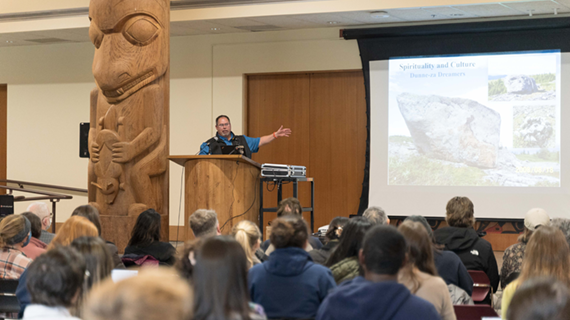Indigenous self-determination is essential for a just future, and Indigenous peoples are leading justice-oriented climate action in many parts of the world. Yet, priorities and processes for climate justice policy and research in settler-colonial institutions often exclude Indigenous voices, intentionally or not. The research partnerships and engagement activities under this stream focus on supporting Indigenous Peoples’ leadership toward the systemic change needed in every policy arena that touches on climate change. This area of work directly serves UBC’s Climate Emergency priorities 1 & 3: to support IBPOC climate leadership and to ensure that Indigenous perspectives, communities, and worldviews shape the development and implementation of climate-related initiatives and policies.
We ask: How can we adopt a decolonial approach to climate justice policy, planning, and governance? As we address the climate crisis, how are we addressing and healing historic harms, creating equity for all peoples?
Topics in this research stream:
- Indigenous leadership
- Decolonization
- Economic self-determination
- Truth and reconciliation
- Traditional stewardship and planning
Project spotlights
Rethinking Sustainability through Indigenous Language Futures
In his chapter featured in Framing Sustainability in Language and Communication, CCJ Affiliate Bernard Perley examines the eradication of Indigenous systems of environmental stewardship and how dominant development fantasies are accelerating a broader crisis of planetary self-destruction. As Indigenous communities work to reinscribe their ancestral voices through worldmaking projects, this piece challenges us to rethink sustainability not in colonial terms, but through Indigenous knowledge systems.
Indigenizing Climate Justice in British Columbia
Partnership with Union of BC Indian Chiefs
We provided a “climate capacity toolkit” to UBCIC, which included tools for communities as well as a policy briefing note to the UBCIC executive. The toolkit reviewed and summarized opportunities available to First Nations for training, certification, and funding related to climate initiatives. The toolkit and policy note analyzed these opportunities through the lens of the BC First Nations Climate Strategy and Action Plan’s 4 pathways and 20 urgent calls for climate action.
Nun ke’ Daahwéhsats (Dancing with the Land)
 A collaboration between West Moberly First Nations (WMFN) and the UBC Centre for Climate Justice (CCJ) that seeks to advance understanding of how climate science, policies, and solutions will affect Indigenous self-determination, cultural values, and rights. To accomplish the project’s goals, WMFN and CCJ created a cooperative climate research agenda to establish priorities and fill these knowledge gaps in line with WMFN community values, and objectives.
A collaboration between West Moberly First Nations (WMFN) and the UBC Centre for Climate Justice (CCJ) that seeks to advance understanding of how climate science, policies, and solutions will affect Indigenous self-determination, cultural values, and rights. To accomplish the project’s goals, WMFN and CCJ created a cooperative climate research agenda to establish priorities and fill these knowledge gaps in line with WMFN community values, and objectives.